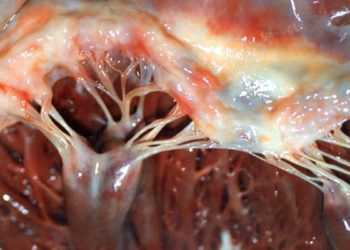Transcatheter mitral valve repair may be a reasonable option in high-surgical-risk patients with degenerative mitral regurgitation
1. In this cohort study, among 19 088 patients with moderate to severe or severe degenerative mitral regurgitation (MR) who underwent nonemergent transcatheter mitral valve repair, MR success was achieved in 88.9% of patients.
2. Among patients with MR success, the lowest mortality was observed in patients with both mild or less residual MR and mean mitral gradients of 5 mm Hg or less, when compared with those with an unsuccessful procedure (11.4% vs 26.7%).
Evidence Rating Level: 2 (Good)
Study Rundown: Mitral regurgitation (MR) affects approximately 3% of the population globally and contributes considerably to morbidity and mortality. Degenerative pathology affecting the mitral valve is the most common reason for isolated mitral valve surgery in the Western world. However, there are limited data on the outcomes of transcatheter mitral valve repair for degenerative MR in a real-world setting. Hence, the objective of this study was to evaluate the outcomes of transcatheter mitral valve repair for degenerative MR. The primary endpoint was MR success which included moderate or less residual MR and a mean mitral gradient of less than 10 mm Hg. A total of 19 088 patients with isolated moderate to severe or severe degenerative MR who underwent transcatheter mitral valve repair were analyzed. MR success was achieved in 88.9% of patients. Transcatheter mitral valve repair was associated with a significantly lower mortality of 14.0% compared to those with an unsuccessful procedure (26.7%). Among patients that demonstrated MR success, the lowest mortality was observed in those with mild or less residual MR and a mean mitral gradient of 5 mm Hg or less compared with those with an unsuccessful procedure. A major strength of this study was its large sample size. The generalizability of the results is limited, however, as the analysis only includes results of the MitraClip device, which was the only FDA-approved transcatheter mitral valve repair device during the study period. Overall, this registry-based cohort study demonstrated that the procedure was safe and successful among patients with degenerative MR undergoing transcatheter mitral valve repair.
Click to read the study in JAMA
Click to read an accompanying editorial in JAMA
Relevant Reading: Twenty-year outcome after mitral repair versus replacement for severe degenerative mitral regurgitation
In-Depth [retrospective cohort]: This study evaluated the outcomes of transcatheter mitral valve repair for degenerative MR in patients in the US from 2014 to 2022. The primary exposure was transcatheter mitral valve repair with the MitraClip device by Abbott. The primary endpoint was MR success, defined as moderate or less residual MR and a mean mitral gradient of less than 10 mm Hg. A total of 19 088 patients with isolated moderate to severe or severe degenerative MR who underwent transcatheter mitral valve repair were analyzed (median age, 82 years; 48% women; median Society of Thoracic Surgeons predicted risk of mortality with surgical mitral valve repair, 4.6%). At 30 days, the incidence of death was 2.7%, stroke 1.2%, and mitral valve reintervention 0.97%. MR success was associated with significantly lower mortality when compared with an unsuccessful procedure (14.0% vs 26.7%; adjusted hazard ratio (HR), 0.49; 95% CI, 0.42-0.56; P < .001) and heart failure readmission (8.4% vs 16.9%; adjusted HR ratio; 0.47; 95% CI, 0.41-0.54; P < .001) at 1 year. Among patients with MR success, the lowest mortality was observed in patients who had both mild or less residual MR and a mean mitral gradient of 5 mm Hg or less when compared with those with an unsuccessful procedure (11.4% vs 26.6%; adjusted hazard ratio, 0.40; 95% CI, 0.34 – 0.47; P < .001).
Image: PD
©2023 2 Minute Medicine, Inc. All rights reserved. No works may be reproduced without expressed written consent from 2 Minute Medicine, Inc. Inquire about licensing here. No article should be construed as medical advice and is not intended as such by the authors or by 2 Minute Medicine, Inc.








